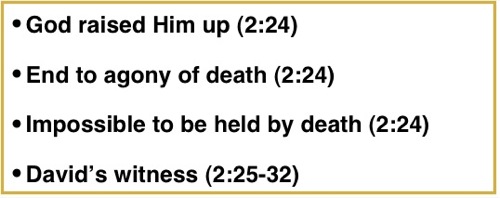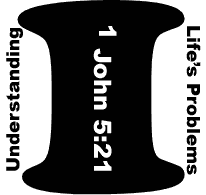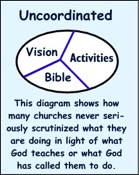
Book of ACTS
Be Saved!
The Bible Teacher's Commentary
on Acts 2:14-40
Paul J. Bucknell
Purpose: The Bible exposition of Be Saved! on Acts 2:14-40 shows the power of the Spirit of God as the birth of the new church era and why three thousand people came to know the Lord on one day.
B. The Focus on Jesus Christ
Acts 2:22-36
Acts 2:14-21 | Acts 2:22-36 | Acts 2:37-40
The Focus on Jesus Christ in Acts 2:22-36, part 3 of 3, focuses on the prediction, fulfillment and significance of Jesus the Messiah's death, resurrection and ascension.
Introduction
Acts 2:22-36 is a long message. A full third of it is comprised of quotes from the Old Testament. Even though the Holy Spirit takes a major role in this event, the focus clearly is on Jesus Christ. This is just as Jesus had predicted. Jesus would ascend and the Holy Spirit would live in His people. The Spirit does not bring glory to Himself but to the risen Lord Jesus. Peter's own words here (as well as the others preaching) are thought to be by some one of the many prophesies (not predictive) mentioned in Acts 2:17.
The main connection of the former prophecy and this passage is quite significant. In 2:21 Peter ends the quote with "Every one who calls on the name of the LORD shall be saved." This becomes the basis of his evangelistic sermon. The key here is the phrase 'name of the LORD.' Joel uses the name 'Yahweh' (this is the reason for the capital letters in the word LORD). Peter goes on and proves this LORD is none other than Jesus Christ, the resurrected One. Peter's sermon focuses on three aspects of Christ's life and ministry: His suffering, resurrection and ascension.
(At times though these Old Testament quotes such as this one Jesus is called LORD (Yahweh) but at other times, He is not. An example of this is in Acts 2:34-35 where the Father (Yahweh) speaks to the Christ (Lord - Adonai). More is said on this later in this article.)
1. Jesus, the Suffering Messiah (2:22-23)
In discussing Christ's death here in 2:22-23, two aspects are mentioned.
(a) Jesus earthly miracles, wonders and signs attest to His deity (2:22)
-
"What is special about Jesus?"
Many people in the audience were familiar with Jesus' life. He first points out that Jesus conducted many signs that those in his midst were well aware of – "just as you yourselves know." This itself is a show of verity of Jesus' own miracles. Peter was bold enough to announce it to all. People would not deny it.
"Men of Israel, listen to these words: Jesus the Nazarene, a man attested to you by God with miracles and wonders and signs which God performed through Him in your midst, just as you yourselves know--" (Acts 2:22).
Jesus was the one set apart for God from His early life (i.e. Nazarene). Though it might refer to the place Jesus grew up, Nazareth, the aspect of being set apart is (Nazarene) more accurate. There are three things about what Jesus did: miracles, wonders and signs. The people could not contest to these things. We should see that the 3000 people's belief in Jesus is quite convincing for anyone.
The three categories would incorporate all the mysterious things that He did. There was cross over in categories. For example, the Feeding of the 5,000 was a miracle but also a sign that He is the Bread of Heaven.
We can put our full trust in Jesus because He did many miracles which were attested by thousands of people. Jesus' departure (ascension) was intricately connected with the sending of the Spirit to the believers' lives.
(b) Not a mistake but planned (e.g. feasts) (2:23)
The question being answered in 2:23 is, "If Jesus was God, then how is it that God allowed evil people put Him to death?" Peter eliminates this whole discussion by speaking about how it was through God's predetermined plan that He sent Jesus to die by the hands of godless men. God had it all planned. If this is the case, then the followup question is this, "Why did God have the innocent One die this horrible way?"

Peter provides part of the purpose for which He brought this up. Jesus' coming was all planned including His death. We see it in the Old Testament feasts. One feast, the Day of First Fruits, was held on the day of Christ's resurrection. The Feast of Weeks , Pentecost, refers to the relative time period which it is celebrated after the Day of First Fruits.
Pentecost literally means 'fifty' which is 7 times 7 days. Christ's death, resurrection and the Holy Spirit's coming are all part of a plan that predated the Israelites and Christ's coming to earth.

Notice how Peter says that they (i.e. "you") "have nailed to a cross by the hands of godless men and put Him to death" (2:23). Peter shows them that God's wrath is rightly upon them because they compelled the Romans to murder Jesus Christ.
At the same time Peter is emphasizing that Jesus has died. This might seem strange but through all these years, so many stories have been brought up suggesting that Jesus had never really died (such as the Passover Plot). The crowd knew Jesus died. Peter could publicly state this because it was true and they could verify it.
In verses 24-32 Peter logically and compellingly moves on from Christ's death to His resurrection.
2. Jesus, the Risen Messiah (2:24-32)
"And God raised Him up again, putting an end to the agony of death, since it was impossible for Him to be held in its power." (Acts 2:24).
Having conclusively reminded them of Jesus' death, Peter continues on in verse 24 and spends much more time providing support for the resurrection of Jesus. Remember this is part of the 'hinge' verse in 2:21, "that every one who calls on the name of the LORD shall be saved."
Peter here shows the importance of the resurrection for without Christ being alive, why would one call upon Him. Secondly it is evidence that He is the One we should call upon for salvation. Below are some significant results from Jesus' resurrection.
-
God raised Him up (Acts 2:24)
God raised Jesus up from the dead. This is what the resurrection means, the bringing back of life into a renewed body. This did not just happen to Jesus. Many others also came alive. But it was different with Jesus in His new body. He would never again die and this is the hope of the resurrection that all His people have. We likewise should be renewed (see 1 Corinthians 15).

-
End to agony of death (Acts 2:24)
This word for agony is the same used for birth pangs. Peter infers by this that the pains brought forth new life. Just as a mother through pain would bring new life, so God through Jesus' pain would bring forth new life. The natural world (which is really supernatural) perfectly illustrates the spiritual. In our fallen world, life comes into existence through pain. Before the fall, there was no pain. "I will greatly multiply Your pain in childbirth, In pain you shall bring forth children" (Genesis 3:21; also see Romans 8:22 onward as Paul discusses this in length).
-
Impossible for Him to be held in its power (Acts 2:24)
Man has this problem with death. We can't on our own escape. As I get older, I need to face the fact of death. It is like a prison. Why was it impossible to be held in the power of death? Peter goes on to explain this in the following quote by simply stating that Jesus had never sinned. He was righteous. The righteous cannot be captured by death. Jesus did die but that was because He bore the sins of His people (Isaiah 53:4).
The fact of Jesus' righteous life is the secret that the evil one had not fully calculated into His scheme. He thought Jesus was dead once for all. It is true for mankind that when he dies, he stays dead. We deserve death because it comes about because of our own sin. But Christ had not sinned. He is wholly righteous and therefore death could not keep Him down. Both Christ's deity and righteousness were proved by the inability to be held by death's grasp. Let's look closer at the quote that supports Peter's statement.
-
David's witness (Acts 2:25-32)
25 For David says of Him, 'I WAS ALWAYS BEHOLDING THE LORD IN MY PRESENCE; FOR HE IS AT MY RIGHT HAND, THAT I MAY NOT BE SHAKEN. 'THEREFORE MY HEART WAS GLAD AND MY TONGUE EXULTED; MOREOVER MY FLESH ALSO WILL ABIDE IN HOPE; BECAUSE THOU WILT NOT ABANDON MY SOUL TO HADES, NOR ALLOW THY HOLY ONE TO UNDERGO DECAY. 'THOU HAST MADE KNOWN TO ME THE WAYS OF LIFE; THOU WILT MAKE ME FULL OF GLADNESS WITH THY PRESENCE.'" (Acts 2:25-28).
In Psalm 16 David affirms he puts his trust in God. Notice the key lines in this Messianic Psalm (although written of David, it really is descriptive of the Messiah).
The phrase "My flesh also will abide in hope" again speaks of the hope of the resurrection. So does the phrase "Nor allow the holy one to undergo decay." These verses in many ways speak or infer of the resurrection of the dead. Peter will build his following arguments of 2:29-31 on these quotes. These Jews from all over the world (and seekers) all were familiar with the Old Testament so we can see why the Apostle Peter referred to the scriptures to both defend and state what happened 7 weeks earlier.
Acts 2:29-32
Peter first states the Messianic character of this Psalm. David both died and was buried. His tomb is with them to that day. That is a powerful statement. For if Psalm 16 does not apply to David, then the question, "Of whom does the Psalm refer?" arises.
David was a prophet and looked ahead and spoke of Christ's resurrection. Jesus was not abandoned (left) in Hades (i.e. the place of the dead) nor did His flesh decay. This leaves us with the proper conclusion that God raised Jesus from the dead!6
Peter again includes himself, the many disciples there and probably others as witnesses to these things that is, Jesus came alive. Everyone no doubt heard about Jesus becoming alive and the tomb stone being removed. Peter is witness; they have heard about the evidence of these things.
Reflection on the importance of the resurrection
Some wonder about the importance of the resurrection. "What difference does the resurrection really make? Is it worth spending so much time discussing or debating the resurrection?" The teaching of the bodily resurrection is important even if we do not realize its importance. The resurrection sets Jesus apart from all the other religious teachers in the world. Jesus is more than just a good teacher.
It is through the resurrection that the Holy Spirit came. Jesus stated this before and after His resurrection. Are we merely living out Christ's teaching in the flesh? We should again be baptized with fire. We need to live in and through the power of the Holy Spirit.
The resurrection affirms the ascension of the Lord where Jesus intercedes for us. If we do not have a living priest interceding for us, surely we would not have a New Covenant. As Hebrew argues, the covenant is good only as long as the priest lives. "But now He has obtained a more excellent ministry, by as much as He is also the mediator of a better covenant, which has been enacted on better promises." (Hebrews 8:6).
- Without Jesus' resurrection, there would be no return of Christ.
- Without Jesus raising from the dead, we would find no power, strength, no guidance.
The importance of Jesus' resurrection is critical to the faith. This is the argument that Paul makes in 1 Corinthians 15. We might be ignorant of the importance of the resurrection, but the whole Christian faith depends upon it. Peter has spent a significant time introducing the evidence for the resurrection (including the aspect of first hand witnesses). He now goes on and discusses the ascension of Jesus Christ.
3. Jesus, the Ascended Lord (2:33-36)
33 Therefore having been exalted to the right hand of God, and having received from the Father the promise of the Holy Spirit, He has poured forth this which you both see and hear. 34 "For it was not David who ascended into heaven, but he himself says: 'THE LORD SAID TO MY LORD, "SIT AT MY RIGHT HAND, 35 UNTIL I MAKE THINE ENEMIES A FOOTSTOOL FOR THY FEET."' 36 Therefore let all the house of Israel know for certain that God has made Him both Lord and Christ--this Jesus whom you crucified." (Acts 2:33-36).
Jesus Christ did not only come alive, but He also went to sit at the right hand of God. Again Peter uses a prophetic utterance from David to give credence to where Jesus is now. The ascension is an important teaching because it explains Jesus' absence. If He were to come alive, then we would all demand to see Him. The ascension, however, solves the mystery of His absence as well as explains the evidence of the Spirit's work.
Jesus' absence is what gives us the opportunity to keep preaching to other peoples where as His now glorious presence would crush the world in its sinful weaknesses. The world would quickly come to a close which will occur upon Christ's return. The Spirit, then, becomes the present proof of the ascended Lord Jesus Christ. The Spirit convicts hearts of sin, repentance and judgment (see John 14-16 for much more on the Holy Spirit).
A Note on the Trinity
Jesus ascended and sits at the right hand of God the Father until all His enemies are eliminated. God has a plan. He is bringing it about. We have a great difficulty in comprehending what some call the doctrine of the Trinity. These verses clearly teach the substance of this teaching though the word Trinity is not used here.
God the Father (2:33), Jesus Christ (2:33,36) and the Holy Spirit's presence (2:33) are all mentioned as existing, working together and being a critical part of God and His plans. It is improper to discard the teaching of the trinity simply because the word is not used.7
We care less about the word and more about the meaning and essence behind it because it is clearly taught in passages like this. Jesus Himself quoted that God is one and yet all things are made through God the Son (Hebrews 1:1-3). It is much better to confess our inability to fully understand and comprehend these things than to assert falsehood.
The resurrection speaks about the power over death and the ascension emphasizes His present functions as mediator, leader, guide and savior. The teaching of the resurrection brings both of these doctrines together, his death and life. Jesus is now ruling and all the Christian teachings are dependent upon the resurrection. If Jesus is still dead, then we are fools thinking about Christ as alive.
Jesus is alive. This truth should greatly consume our attention. What does He seek from us? What is our relationship with Him like? How shall we repair a poor relationship with the Lord? How can we most effectively work with Him? Some children get bitter at their parents and 'ditch' them. We must refuse to treat the Lord this way.
Jesus is Lord
It was earlier mentioned that we should call upon the LORD for salvation (2:21). This is true. Who is the LORD? Before leaving this section of teaching, Peter again points us to faith in this LORD. It is critical that we do not miss this point.8 Because this point is based on the Hebrew language from where the quote derives, we need to further discuss this.
"For it was not David who ascended into heaven, but he himself says: 'THE LORD SAID TO MY LORD, "SIT AT MY RIGHT HAND, UNTIL I MAKE THINE ENEMIES A FOOTSTOOL FOR THY FEET."' "Therefore let all the house of Israel know for certain that God has made Him both Lord and Christ--this Jesus whom you crucified." (Acts 2:34-36).
Peter's argument was established in 2:21, "Whoever calls on the name of the LORD (Yahweh) will be saved." This Lord that we should worship and call upon is Jesus Christ. He is the living Lord. He reigns. He is both savior and Lord and therefore we should by all means call upon Him. This is certain. It is fact. For those at Pentecost, no other explanation of this and Jesus' miracles was available.
"Whoever calls on the name of the LORD will be saved."
They looked for an explanation and here they are to respond to the fact that they had indeed crucified the Messiah and yet God whom they supposedly worship made him Lord and Christ. After committing such offenses, they surely needed a Savior. We, however, also need the Savior for we in our own way offend the Living God and spurned His offer of salvation.
Peter rightly continues offering the amazing message of salvation.
Next -> C. The Exhortation to the People (Ac 2:37-40)
BFF -> Moving our generation's heart and mind closer to the Lord through the powerful truths of God!






